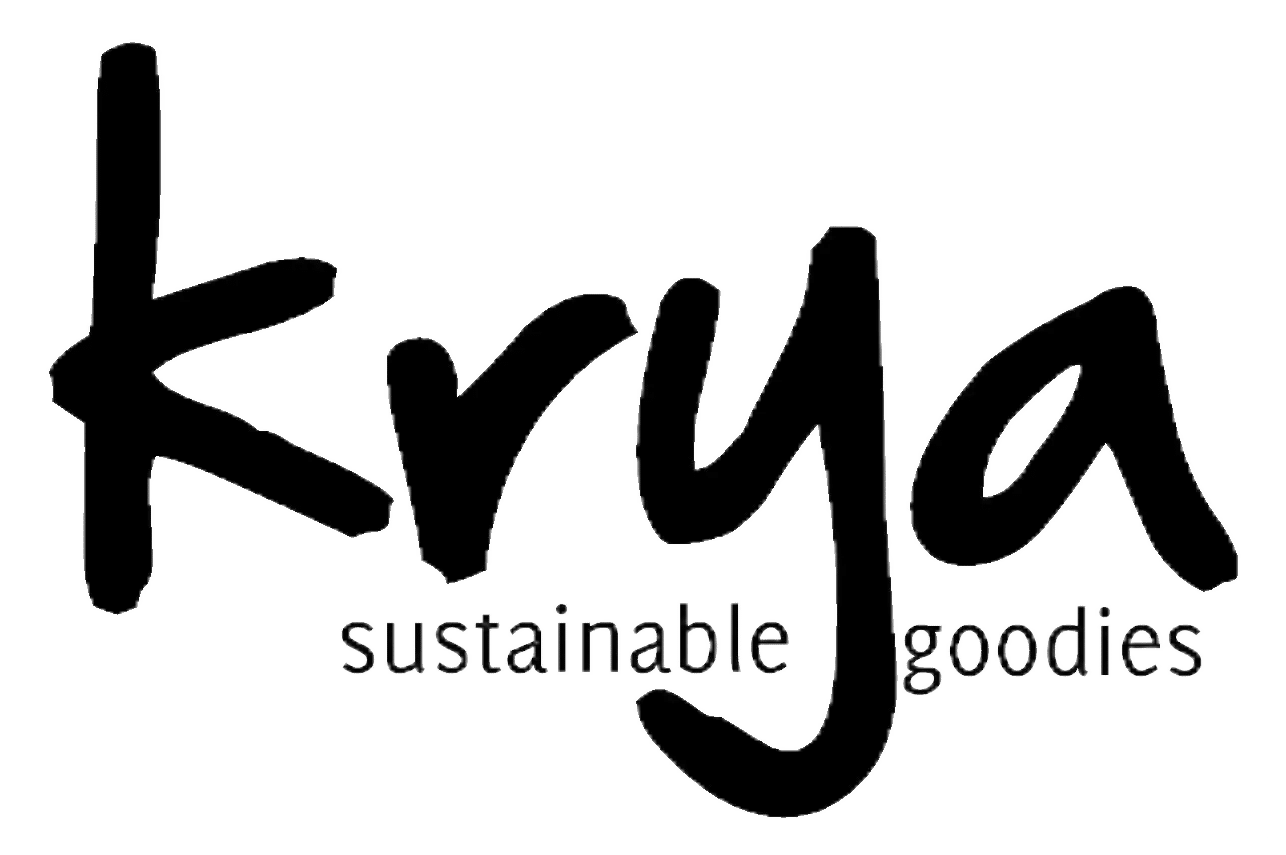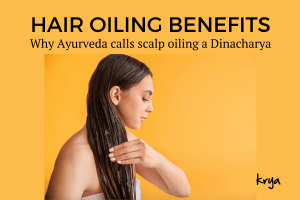When we describe our products and talk about how our products contain only purely natural, ayurvedic herbs, we often hear a counter: “But how can I tell if my shampoo is truly natural” (or face wash or body wash). This is an interesting and challenging question.
What makes a product “a truly natural product”? Do we go by the conventional easy definition which says that if a product’s main ingredients are derived from renewable, plant based resources and not petroleum, a product is natural?
If we did follow the above definition, Krya would be a completely different company today and we would be selling loads and loads of shiny, water based products in bottles with pretty colours and scents. So, clearly, this is not Krya’s definition of a truly natural shampoo / face wash / face serum.
What is a truly natural product: Krya’s standard
Krya follows a much more stringent and strict standard of what consists of a truly natural product. All our products are made only from 4 kinds of ingredients:
- Whole Plant parts ( herbs, roots, shoots, leaves, fruits, flowers and seeds). When we say the word “Whole” we mean harvested fresh or dry plant parts , not extracts, distillates or essences.
- Whole plant based, expeller pressed, organic Oils and Butters
- Whole Plant pressed essential oils
- Clays, Earth and Soils with specific healing characteristics
Any ingredients that does not meet the above 4 criteria is not used at Krya. So we do not use Plant based extracts, even if they are more potent and concentrated: as they do not fall into or “Whole Plant” definition. We do not use solvent extracted oils even if they are cheaper, as they are neither organic nor cold pressed.
And we do not use any ingredients that are DERIVED as a secondary or tertiary by product from plants. To us these are simply chemicals which have been extracted from Plants and are not truly natural. So we use no surfactants like Sodium Coco Beteine. Nor do we try and pass of Sodium Laureth sulphate as a natural, coconut based surfactant. Because we understand that even though these ingredients may have once formed a part of a plant, their extraction and isolation process have transformed them into something else- they can no longer be called “truly natural”.
Which brings me to the second important part of what makes a product, truly natural: the way it is processed.
What is a truly natural product: Krya’s processing standard
As we have seen from the above examples, ,today even harmful chemical surfactants like Sodium Laureth Sulphate are being passed off as natural. This is because the source this chemical compound was originally isolated from was a plant.
To keep our process truly natural, and ensure such chemicals do not pass muster at Krya, we follow a stringent processing standard in our factory:
- We start production only with WHOLE herbs – we do not work with isolates, extracts or essences as many of them are made using chemical isolation techniques
- The herbs are bought WHOLE, cleaned and then processed in the correct manner and then sent for final manufacturing
- The herbs are not altered with or tampered in any way – we do not change their colour, aroma, texture or any other properties deliberately
- We use only solid formats which do not require any preservatives. By avoiding the use of water in our products, we are bale to ensure that not a single preservative, base, or any manner of manufactured ingredient goes into our products
- The herbs used in each of our products add up to 100% – there is no OTHER filler, base or any other synthetics used in our products
- All fresh herbs, fruits and oils used are sourced only from organic sources, in season. We do not use out-of-season, chemically treated produce.
- Oils are made from scratch using the ayurvedic tila paka method. This method of ayurvedic oil manufacturing helps extract botanical nutrients much more efficiently into oil. It also helps us avoid the use of fillers, colours, stabilisers and preservatives.
This definition of “100% natural” or “truly natural” is unique to Krya. This definition goes way beyond legal requirement or license guidelines. Even the strictest of natural product certifications allow some inclusion of synthetics to make up a format. But we, are proud to say, that our internal requirement is the strictest and most accurate definition of a truly natural product.
This definition of creating “truly natural” product imposes some restrictions and challenges for us as formulators. It is the solving of these restrictions and challenges that lead to the differences between how natural products look and feel compared to synthetics.
Challenges faced when creating a truly natural product
One of the reasons large corporations gravitate towards making standardized chemical formulations is their ease of use and simplicity to manufacture. Because standardized chemical ingredients are used in the making of these products, the output we get is also standard.
So your synthetic detergent will always look , feel, and smell the same. You can literally close your eyes and smell its chemical fragrance and identify what you are using.
This simplistic consistency is not possible to achieve in a truly natural product due to a number of factors. This is possibly why many Krya consumers can observe minor variations across our batches of cleansers, oils and lepas. Sometimes there is also a variation across seasons. why does this occur? We will explain this through today’s post.
Seasonal variation in produce : truly natural products
Krya uses fresh organic produce seasonally in each of our skin and hair oils. Our skin oils use varied organic produce like pomegranates, muskmelon, pineapple, mangoes, etc. These organic fruits go into the Krya Classic skin oil and the Krya Moisture Plus skin oil and the upcoming Krya After sun Skin oil and the Krya Dauhridini Body oil.
The selection of this set of organic fresh produce depends upon season, and the problem we are trying to solve. Every single fruit comes with its own inherent colour, taste, aroma and texture. So if the organic produce that goes into the oil changes, the oil will also subtly change, echoing the characteristics of the produce that goes into it.
So, it stands to reason that if a company says it is adding an organic mango into its product, you should not see this variant in february. It should only be available in the organic mango season!
Availability of herbs : a challenge faced when creating truly natural products
The Ayurvedic Samhitas and Nighantus document several thousand herbs with many variations in sub species depending upon geography and climatic conditions. However, due to dwindling interest, urbanisation and lack of proper collection mechanisms, many of these herbs are not easily available to us.
But, as we expand our product base and widen our search, we stumble upon certain herb collectors or organisations who can source some of these herbs for us. Therefore, our formulations always have a small percentage kept aside for these kind of rare herbs. Whenever they become available to us, we add them into our formulations.
An example of this is “kaala haldi” or Curcuma caesia. This is a rare variety of Zeodary which is documented as being found in the eastern wetlands of Bengal and Assam.
Curcuma caesia is a renowned herb to help cure certain skin diseases, reduce vata aggravation and joint pain, etc due to its high camphoraceous content.
We have been searching for reliable suppliers of Kali haldi for a few years now and have just stumbled on a source. So when we get access to herbs like this, they find their way into our formulations.
So formulae can also vary / change depending upon availability of herbs. This affects the way the final products looks / feels and smells.
The effect of regional and geographical differences on herbs:
The Ayurvedic Samhitas tell us that the “kala” (season) and “desha” (geography) from where a herb is harvested alters the properties of the herbs subtly. This is because of the climatic conditions under which the herb grows and also the richness and natural nutrients available in the soil.
An example of this is one variety of organic turmeric which we source from Meghalaya. This variety of turmeric is the same species of turmeric which is used across Indian households in cooking. But due to its cultivations in this hilly region, presence of abundant rain and relatively un-urbanized and pristine surroundings, the turmeric has a much higher percentage of Curcumin as is seen in the plains. This makes the turmeric slightly higher in oil content, and its colour is a distinct yellow-orange with a strong and rich aroma.
In this example, the herb is distinctively different from its counterpart that grows on the plains. But this does not make it superior to other varieties of organic turmeric – just different and more suitable to its “desha”.
We see subtle differences across many herbs depending upon “desha”. For example: the Sapindus trifoliatus (soapberry) we use across our products has regional differences when sourced from wet climates vs dryer climates – the colour of the fruit, aroma and foam head all differ depending upon geography.
Seasonal variations in herbs
The Ashtanga hridayam tells us that herbs are less juicy, intense and more woody in Adana Kala and in seasons like Greeshma Ritu (summer season). So when we make our hair and skin oils in Summer vs say Winter, there is a marked difference in the Swarasas (fresh juices) , Kashayas (deocotions) and Kwathas (herb infusions) we make as a prequel to making our final oil.
The Swarasas make in dry season is typically darker, more intense in its aroma and is much more concentrated. This makes the oils made in this season look darker and feel slightly thicker.
All these above reasons cause minor , subtle variations in truly natural products like Krya’s hair, skin and home care products. These differences do not affect how the products works for you, but it will affect the consistency of aesthetics you come to expect from a product.
The Krya “Signature” – what continues unchanging across all our batches
Someone reading this could very well ask what unites our products across batches despite minor changes in the formulations. Yes a truly natural product can expect to get perfect consistency across every single batch due to all the factors listed above. But, at Krya, we try and ensure there are a few uniting factors across our formulations:
Use of Signature Ingredients in Krya’s products:
In some of our products, we use certain “Signature Ingredients”. An example of this is Chamomile and Green Tea which go into the Krya Classic face wash formulation. Since our test launch of this product in January 2013, these signature ingredients go into almost every batch of the formulation.
We have, so far, made only one batch without the use of organic Chamomile due to lack of availability from our regular supplier. Regular customers were quick to pick up this difference and demanded to know why their facewash was not smelling the way it used to!
Signature Colours across Krya’s products / product categories:
Many Krya hair oils and skin oils have a signature colour or belong to a specific colour family. For example, the Krya traditional Baby massage oil usually has a reddish-brown colour due the use of Manjishta in the formulation.
Both the Krya Abhyanga Oils (classic and Intense) also have this reddish brown colour and a distinctive fragrance due to the use of certain herbs like bala, ashwagandha, nochi leaf, etc.
Signature properties across each batch
Notwithstanding the minor differences in formulation depending upon seasonality, herb availability, etc, obviously the one major uniting factor across each batch is the way each Krya product works for you.
We take care to ensure that the texture of the product is similar across batches. This is especially important in products meant for sensitive skin like the Krya toddler bodywash for Sensitive Skin and the Krya Sensitive Bodywash for Adults. Here due to the dosha vitiation in skin, skin is particular sensitive to rough edges in the product and a small texture change can trigger a reaction like a rash.
Similarly, despite minor formulation changes, our skin products meant for Pitta prakriti skin like the Krya Classic range or the Krya After Sun range is always designed to cool, soothe and draw out excess Pitta from skin. So the products always feel refreshing during use and skin feels lighter and fresher after use.
To Sum up:
Truly natural products are a minuscule minority. Most often , we have standardised commercial products hiding under the guise of a truly natural product. Therefore, when we do come across truly natural products, we are taken aback at their aesthetics and the textural and minor differences we see across batches.
I hope this post educated you on why these differences in texture, aroma or colour could exist in a truly natural product. I also hope this post helped you appreciate the many challenges behind creating a truly natural product.
If you too would like to try our truly natural range of skin, home and hair care goodies, please explore our offerings online. For product queries or doubts please write to us or call us on (0)75500-89090.

















